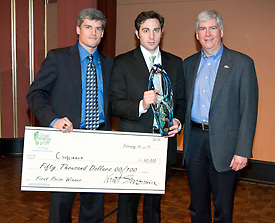More online
A company whose technology could lead to cheaper lithium-ion batteries won the top prize of $50,000 in the 2011 Clean Energy Prize business plan competition. Gov. Rick Snyder spoke at the awards ceremony Friday at Rackham Auditorium.
“This is about doing new things. This is about creating an exciting future. If you don’t win today, don’t lose that fire, that passion for innovation. Learn some lessons and don’t give up,” Snyder said.
The Clean Energy Prize, established by DTE Energy and U-M in 2008, is designed to encourage entrepreneurship in Michigan and the development of clean-energy technologies. This year’s contest was organized by the College of Engineering’s Center for Entrepreneurship and DTE.
The winning company, CSquared Innovations, is a U-M start-up project that has developed a faster, cheaper, laser-based method of making nano-structured materials and coatings for lithium-ion battery electrodes, solar cells, and industrial coatings. The company, which should launch shortly from U-M Tech Transfer’s Venture Center, is based on technology developed in the lab of Pravansu Mohanty, a professor in the Department of Mechanical Engineering at U-M Dearborn.
“The exposure and experience we’ve gained from the Clean Energy Prize are extremely valuable to us at this point in our business,” said team leader Nick Moroz, a doctoral student in the Ann Arbor campus’ Department of Materials Science and Engineering. “I’m very excited to take the next step and to establish our firm as a strong clean-tech presence in the Li-ion battery market and to begin creating jobs in Michigan.”

Nicholas Cucinelli, left, of U-M Tech Transfer joins Nick Moroz, of the winning Clean Energy Prize team CSquared Innovations, and Gov. Rick Snyder onstage at Rackham Auditorium. Cucinelli is Moroz’ mentor. Photo by Eric Bronson, U-M Photo Services.
In addition to Mohanty and Moroz, other team members are Ramesh Guduru, chief scientist, and Harishankar Umapathy, operations manager.
President Mary Sue Coleman commended all the participants for their ideas and their energy.
“We can all be proud of the teams that competed in this statewide event, because it is a powerful statement about our collective future,” Coleman said.
Gerard Anderson, DTE Energy president and CEO, said this year’s competition exceeded expectations in several ways.
“With a starting field of 23 teams representing seven Michigan colleges, the competition has achieved a scale that we had hoped for but did not anticipate reaching in just three years. Also, the quality of the proposals and the talent of the students continue to surprise and impress us,” Anderson said.
Previous Clean Energy Prize winners continue to build their businesses.
Algal Scientific, the 2008 winner, has raised more than $300,000 in cash and in-kind services to support its technology that uses algae to simultaneously treat wastewater and produce the raw materials for biofuels. The company employs nearly a dozen staff and technical advisers and is deploying a demonstration-scale wastewater-treatment plant at an industrial facility in Ohio.
Enertia, the 2009-10, winner, is continuing to develop and refine its tiny generators that produce electricity from random ambient vibrations. The company has demonstrated a second-generation prototype that can turn vibrations from traffic on a suspension bridge into useable electricity.
Three other teams were honored in the 2011 contest. Team Smart Energy, out of U-M, won second prize and $25,000 for its innovative financing model to retrofit municipal buildings for energy efficiency savings. Team Impact Card, also out of U-M, won third and $10,000 for its first-of-its-kind funding mechanism that aggregates consumer credit card reward points as project financing for renewable energy development. Team Perennial BioEnergy, out of Western Michigan University, finished fourth and received $7,000 for its plan to develop a pennycress-based biodiesel industry.
Contest sponsors include The Masco Corporation Foundation, The Kresge Foundation, UBS Investment Bank, Google, Huron River Ventures and GM Ventures. In addition to the Center for Entrepreneurship, other U-M groups involved in organizing the contest are the Stephen M. Ross School of Business’ student organization Ross Energy Club, the Business Engagement Center, the Michigan Memorial Phoenix Energy Institute and the Office of the Vice President for Research.


